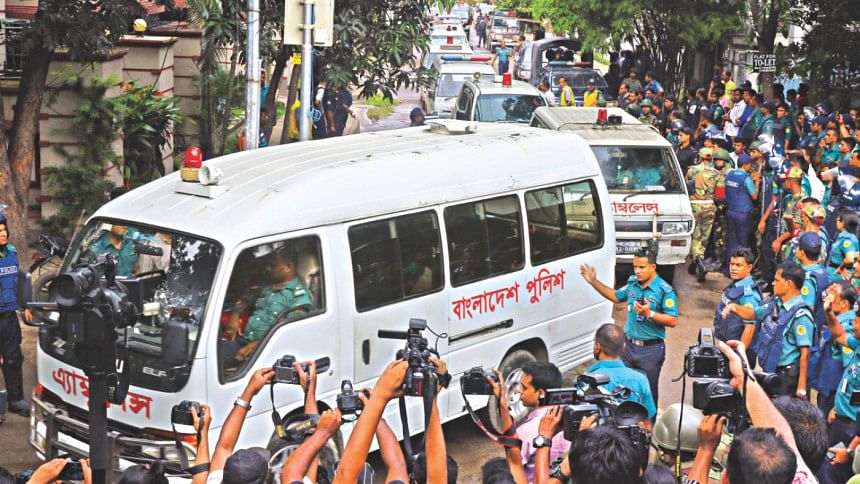Mudslinging, blame game won't solve it

Strong intelligence gathering, professionalism of law enforcers and thwarting of the ideological roots of militants could prevent future militant attacks, security experts said yesterday.
They also suggested uniting people irrespective of cast, creed and political affiliation against militancy and creating awareness among people.
Security analysts also advocated stopping the political mudslinging and blame game after such incidents and instead going into facts and finding the real perpetrators.
There have been a number of targeted killings over the last two years but after each of them, there had been political mudslinging and blame games, said former inspector general of police Nur Mohammad.
Neutral investigation should be carried out after every incident and the reason for the attack and the people behind them should be unearthed, he told The Daily Star.
The former police boss said the attack in Gulshan, a highly secure neighbourhood, testifies that it was well planned.
He emphasised the need for creating awareness against militancy in schools, colleges, universities, madrasas and mosques.
Brig Gen (retd) M Sakhawat Hossain, another noted security analyst, said following a series of targeted killings, there was an apprehension that a big attack might be carried out.
Questioning the preparedness to prevent such attacks, he said intelligence agencies were “over burdened” with other work.
“How did they [attackers] bring huge weapons in such a tight security area. It's a big question ... We couldn't take proper preparation. We couldn't direct the forces properly,” he said, adding, “We could have prevented such an attack if we were prepared enough.”
The Gulshan attack was just two weeks after a week-long drive against militants when over 15,000 people were arrested and many of them were BNP-Jamaat men with no priors.
When his attention was drawn to the drive, Sakhawat said: “We couldn't complete out objective. It [the drive] rather raised questions about the credibility of law enforcers.”
The militant operation carried out at the Dhaka restaurant is akin to Paris and Brussels attacks and it hardly matters whether it was carried out by ISIS or Al-Qaeda, he said.
Instead of finger pointing or making rhetoric, meticulous strategies have to be drawn up to deal with the challenge.
Time was a crucial factor, the decision for calling in the commandos should have been quicker, he said.
He emphasised the need for increasing capacity of the intelligence agencies to prevent such attacks.
Instead of keeping the intelligence agencies busy with surveillance over political opponents or other petty work, intelligence agencies need to be made more active in preventing militant attacks, he added.
The reasons for a group of people getting radicalised need to be found and people need to be united in fighting militancy, he added.
Brig Gen (retd) Shahedul Anam Khan said the heavily armed assailants were able to precisely strike their target in a “high security diplomatic enclave” and this demonstrates inherent lapses in the security measures and lack of intelligence.
Periodic drives for busting militant elements physically or resorting to wholesale arrests were not the way to contain the actual threat, he said, adding that the purpose of the security forces' periodic drives was not to combat militancy, but to go after political opponents.
“Militancy has to be tackled with specific intelligence and ideological strategies,” said Brig Anam, also editor, Op-Ed and Strategic Affairs, The Daily Star.
Air Cdre (retd) Ishfaq Ilahi Choudhury while talking to a TV station said, “We have to ensure such terrorist attacks do not recur and we have to take steps to that end immediately.”
He said the steps were not merely to strengthen the law enforcement forces but to have a comprehensive plan to delve out the roots of militancy, patrons of militants, their training centres and their sources of arms.
The militants were carrying out terrorist operations like trained troops, he said.
It shows that they went through rigorous training and had ideological motivation, he said, adding that it was an ideological battle, not merely physical.
Every time there is an attack, ground-level members of militant outfits get killed but the ideological masterminds are not identified. Unless the masterminds are captured, such militant threats would not be eliminated, he said.
A serving police official, having expertise in militancy, suggested reshuffle the field-level command of police to stop the recurrence of targeted killings.
“Most of the filed-level police commands are in their positions due to political backing, in some cases even after recurrence of targeted killings although many of them lack professionalism and skills,” he said, wishing not to be named.
The government should appoint new blood and professional officers to thwart such attacks.
He said in the recent special drive around 16,000 people, mostly petty criminals and political opponents, were arrested and as many as 16,000 police personnel had to be engaged for several hours to prepare documents to press charges against them.
“Had those forces not been engaged in such activities for hours, the Gulshan attackers might have been arrested before the execution of their plan,” he added.

 For all latest news, follow The Daily Star's Google News channel.
For all latest news, follow The Daily Star's Google News channel. 



Comments